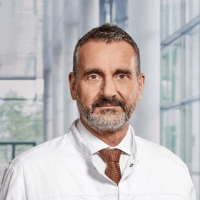Pulmonary Valve Repair for Pulmonary Valve Insufficiency in Germany
Treatment prices are regulated by national law of the corresponding countries, but can also include additional hospital coefficients. In order to receive the individual cost calculation, please send us the request and medical records.

Department of Cardiothoracic Surgery
According to the Focus magazine, the Department of Cardiothoracic Surgery ranks among the top German medical facilities specializing in the surgical treatment of diseases of the cardiovascular system and lung cancer! The department offers the full range of surgical services for the treatment of diseases of the cardiovascular system, respiratory tract, including heart and lung transplantation, artificial heart implantation. The therapeutic options include aortic surgery, coronary artery bypass grafting, transplantation surgery, surgical treatment of heart rhythm disorders (arrhythmias), minimally invasive surgery, surgical treatment of the heart valves, including reconstructive interventions. All operations are performed using state-of-the-art technology and in accordance with the current recommendations of professional societies.






Department of Cardiac Surgery
The Department of Cardiac Surgery provides a full range of surgical treatment in its area of specialization. Special emphasis is placed on heart valve repair and replacement surgery, coronary artery bypass grafting, thoracic aortic surgery, adult congenital and acquired heart disease surgery, pacemaker and defibrillator implantation, and artificial heart implantation for severe heart failure. Many heart operations are performed using minimally invasive techniques, which has a positive effect on the healing of the surgical wound. Minimally invasive cardiac procedures also reduce surgical risks and contribute to a rapid recovery of the patient in the postoperative period. Surgical treatment of cardiac pathologies is performed in advanced operating rooms equipped with the latest technology. The cardiac surgeons of the department successfully perform routine and complex surgical procedures, saving the lives of thousands of patients. The specialists work in accordance with current clinical protocols and follow the recommendations of the German Society for Thoracic and Cardiovascular Surgery (DGTHG).


Department of Cardiothoracic Surgery and Vascular Surgery
The Department of Cardiothoracic Surgery and Vascular Surgery provides effective surgical treatment for diseases of the heart, respiratory system, and blood vessels. The team of cardiac surgeons operates on patients with heart valve pathologies, coronary heart disease, heart failure, and heart rhythm disturbances. In the field of thoracic surgery, the key focus is on the surgical removal of lung tumors and lung metastases. The specialists in this area also perform surgery to repair chest wall deformities. In the field of vascular surgery, interventions for abdominal and thoracic aortic aneurysms are most often performed here. The department's vascular surgeons are also exceptionally competent in the treatment of peripheral occlusive arterial disease. A great advantage for the department's patients is that almost all surgical interventions are performed using minimally invasive techniques, so there is no need for a long postoperative recovery. The department's operating rooms are equipped with state-of-the-art technology. This allows for effective and safe treatment. The priority is always personalized medical care for patients.






Pulmonary valve insufficiency is a rare heart disease. This condition is usually treated with replacement surgery, while plastic repair, the restoration of the heart valves with the patient's own tissues, usually the pericardium, is a less common option. This is a rare operation and it will be quite a challenge for you to find a Cardiac Surgery Center where doctors are highly experienced in performing this surgery. The specialists from the Booking Health company will help you with this task. On our website, you can find the cost of treatment in Germany. Please leave your request to get help in selecting a hospital, and the Booking Health specialist will contact you to advise on treatment in Germany.
Content
- A brief description of the disease
- Treatment of heart valve insufficiency with plastic repair surgery
- Where to undergo treatment?
A brief description of the disease
The pulmonic valve is located inside the pulmonary artery. It passes blood from the right ventricle into the pulmonary circulatory system and prevents it from returning back when the heart muscle relaxes.
As in any other valve, stenosis or insufficiency may develop at this site. In the case of insufficiency, part of the blood returns back. Stenosis causes the narrowing of the opening of the heart valve, and it is more difficult for the heart to push blood into the blood vessels. Insufficiency does not exclude the presence of stenosis and, in some cases, these conditions can be combined.
Pulmonary valve insufficiency can be absolute or relative. In the first case, the heart valve is damaged, most often due to medical manipulations such as surgery for tetralogy of Fallot or transcatheter procedures (for example, balloon angioplasty for heart valve stenosis). In the second case, the heart valve remains normal but the pulmonary artery expands, inside which the heart valve apparatus is located. The leaflets then cannot close the orifice completely. The most common cause of relative insufficiency is pulmonary hypertension.
Grade 1 pulmonary valve insufficiency is not considered dangerous. Even in grade 2 disease, symptoms are often absent and the quality of life remains high. For this reason, in the twentieth century, surgical treatment of the disease was not very common. However, as it was studied, it turned out that in the future, patients would develop complications such as a dilated right ventricle and heart failure. Therefore, starting from grade 2, pulmonary valve insufficiency should be treated, even if a patient has no symptoms or they can only be detected by exercise tests.
If a patient does not have surgery, the symptoms of the disease will manifest themselves after many years, and they will be caused by impaired function of the right ventricle. Symptoms may include shortness of breath, arrhythmias, and, in severe cases, the veins in the neck swell and the liver becomes enlarged.
An ultrasound scan is made for the diagnostics of the disease. More accurate information about the structure of the valvular apparatus can be obtained using an MRI scan. The technique is used during the preparation for surgery and influences the choice of treatment tactics. Among other things, it helps to determine whether a patient is a candidate for heart valve plastic repair or whether they need replacement surgery.
Treatment of heart valve insufficiency with plastic repair surgery
Doctors may use the following two options for the treatment of pulmonary valve disease:
- plastic repair surgery, which involves heart valve repair, sometimes from the ground up;
- replacement surgery, which involves the implantation of an artificial valve.
Replacement surgery is considered the main treatment method for this heart disease at hospitals in Germany. Doctors implant only biological prostheses since when using mechanical ones, the risk of thrombosis remains high, even if a patient is taking anticoagulants.
Although pulmonary valve replacement surgery provides patients with good results, they are short-lived. Biological heart valves have a limited lifespan. Moreover, the younger the patient, the faster signs of dysfunction of the artificial valve appear. In children, the pulmonary artery grows but the valve remains the same. In addition, they have faster degeneration of the bioprosthesis. As a result, 20% of patients have to undergo revision surgery after 5 years, 40% of patients have a repeated operation after 10 years, and 60% of them undergo revision surgery after 15 years. The service life of the prostheses in adult patients is longer, and they function 15-30 years. However, because most people with pulmonary valve insufficiency are young, replacing the prosthesis may require not one, but two or more operations over the course of their lives.
Some doctors, therefore, prefer to use an alternative treatment option. They perform heart valve repair surgery. It is effective for both insufficiency and stenosis.
The operation is performed on an open heart with the use of a heart-lung machine. Heart valve plastic surgery involves heart valve restoration with autologous tissues, such as the patient's own pericardium. If the leaflets are partially damaged, they can be repaired by suturing the defects or applying patches. In some cases, the heart valve may be practically absent. Even in such cases, it can be successfully repaired by reconstructing the leaflets with patches from the pericardium.
Heart valve repair surgery is technically more complex than replacement surgery. It is better to undergo your treatment abroad at a specialized hospital to avoid complications and get good long-term results. You can receive high-quality medical services in one of the developed countries, for example, at hospitals in Germany. As a result of surgery, patients experience relief of symptoms, improved quality of life, and a reduced risk of heart complications.
Where to undergo treatment?
If you are going to have your treatment abroad, you can seek medical attention from hospitals in Germany. This country offers high-quality medical services. With the Booking Health service, you can find the cost of treatment in Germany, compare prices, and make your appointment at the best hospital at a favorable price.
There are a few reasons for you to undergo your treatment in Germany. These are as follows:
- high-precision diagnostics will help to establish the presence of heart disease, clarify its severity and anatomical variants to determine the optimal treatment method;
- modern and well-equipped Cardiac Surgery Centers;
- doctors at specialized hospitals in Germany have vast experience in pulmonary artery repair, which is a rare surgery not available in every center;
- there is a low risk that the condition of the heart valve will worsen in the future, and the operation will have to be performed again;
- several heart defects can be simultaneously cured at hospitals in Germany during a single operation, if necessary.
If you are undergoing your treatment in Germany, you can be sure that you will get good results. Most people do not suffer from complications. After the operation, each patient is provided with comprehensive care. Rehabilitation at hospitals in Germany begins in the initial postoperative period, which reduces its time and further reduces the risk of complications.
You are welcome to use the Booking Health service to make your treatment appointment at one of the hospitals in Germany. We will select for you the best center specializing in the treatment of heart valve disease. The Booking Health employees will fully arrange your trip. The cost of treatment in Germany will be reduced due to the absence of additional fees for foreign patients.
Authors:
The article was edited by medical experts, board-certified doctors Dr. Nadezhda Ivanisova and Dr. Vadim Zhiliuk. For the treatment of the conditions referred to in the article, you must consult a doctor; the information in the article is not intended for self-medication!
Sources:

